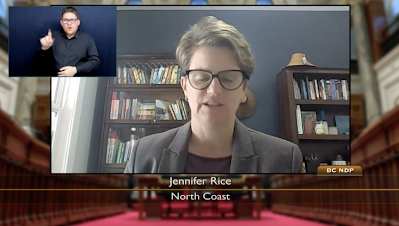The North Coast Fishing is gaining some additional attention this month, from a presentation from MLA Jennifer Rice in the British Columbia Legislature to a call for signatures to a petition from the UFAWU-Unifor.
The importance of the fishery to the North Coast was the theme for MLA Rice on Monday morning, with her focus that of the challenges facing the commercial fishing industry and the impact on local communities and First Nations.
Commercial fishing is one of the founding industries of this province, and its significance can be found painted on the ceilings of the B.C. Legislature along with representations of the mining, forestry and agricultural industries.
The fishing sector is a cornerstone in the economic and social fabric of B.C.'s coast, and fishing and fish processing is deeply rooted in our history and our culture.
But fishing communities are struggling, and fishermen nowadays are unfairly portrayed as the perpetrators of all negative impacts to fish.
In fact, many influences, including fisheries mismanagement, poor policies, warming oceans and habitat destruction all impact global fisheries.
First Nations make up the vast majority of commercial fishermen on the north and Central Coast and Haida Gwaii, and they rely on good stewardship for food, social and ceremonial purposes as well as income.
Every year fewer rural fisherman can go commercial fishing.
Older fishermen who want to retire from fishing find that they can't sell their licences at a reasonable price. Younger fishermen can't afford to buy in to the more lucrative fisheries, primarily owned by multinational corporations.
The cost to buy a license or quota is in the hundreds of thousands, if not millions, of dollars
Ms. Rice's presentation also noted of the need for more local control over fishery resources for the communities that harvest them.
Northern and rural shore workers are also seeing processing move to the Lower Mainland or to Asia.
However, globally, fishing is increasingly providing more value to communities, even though we may be catching less fish.
Independent fish harvesters need protections to rebuild the backbone of the rural middle class along our coast.
We can promote policies that support local fishermen to benefit from B.C. resources and shore working employment in coastal communities with adjacency policies like those found in the forestry sector.
Rural community benefits can be achieved through offering fishermen, or communities control over access to fish.
While there may be limited awareness of commercial fishing among the general public, it remains a mainstay of rural coastal economies, many of which are First Nations communities who have lived and fished the coast for millennia.
Ms. Rice's Presentation to the Legislature is available through the Legislature Video Archive starting at the 13:48 PM mark of the Monday afternoon session.
For UFAWU-Unifor, which represents many of the workers in the industry on the North Coast, the concerns over the selling off of the industry to global interests is the theme of a petition they have recently launched.
The petition features seven areas where the petitioners believe the Minister of Fisheries, Oceans and Canadian Coast Guard is not addressing the areas of concern from those in the industry.
Among some of the themes explores in the petition:
An absence of restrictions on foreign ownership of fishing licences and quotas, how that foreign investment is in direct competition with DFO and First Nations pursuit of acquisitions of fishing licences and how Foreign ownership compromises domestic food security.
 |
| click to enlarge |
More notes on the Fishing industry on the North Coast can be explored from our archive page.
A look at the work of the MLA's of the Northwest at the BC Legislature can be reviewed here.


No comments:
Post a Comment